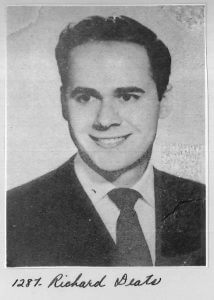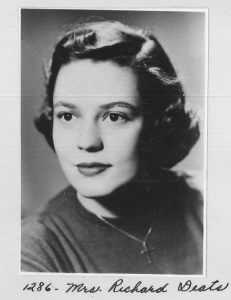
Board of Missions of the Methodist Church, “Mission Photograph Album - Portraits #11 Page 0081,” UMC Digital Galleries, accessed November 27, 2018, http://catalog.gcah.org/omeka/items/show/61319.
Advocate for Peace and Justice
Deats grew up in a Methodist family in Texas and attended McMurry College in Abilene, Texas, in the early 1950s. There he became active in the Methodist Student Movement which was beginning to voice concerns about civil rights and racial justice, holding its first interracial meeting at McMurry. A visit from Muriel Lester, who was active with the International Fellowship of Reconciliation, changed his life. She talked about the inner life of prayer and the Sermon on the Mount, bringing to Deats and others her passion for world peace. He was inspired by the vision of ‘the brotherhood of man under the fatherhood of God’ and bought and read all of her books. While attending Perkins School of Theology to study social ethics, he met Walter Wink. They began to talk about going to Brazil as missionaries. When Deats made contact with the Methodist Board of Missions and began to explore the idea further, the Philippines was mentioned. The idea of ministering there appealed to him because the culture shared Roman Catholic and Hispanic elements with Texas.
Following seminary graduation and marriage, he moved to Boston University, where he completed requires for his Ph.D. in 1959 before leaving for an assignment as a student worker in the Philippines. When he arrived there, however, he received a telegram from Bishop Jose Valencia that read: “Assignment as pastor at Knox begins this Sunday.” Knox was in downtown Manila, the largest English-speaking church in Asia; it had four congregations, each with its own pastor who preached in his own language. In his congregation was the president of the seminary, who invited Deats to teach a course. By his second year in the Philippines, he was the full-time social ethics professor at the seminary.
The philosophy with which he entered missionary service was shared by many in the church. As the war in Vietnam began to heat up, he got together with a small group to form a committee of Americans for Peace in Indochina. They sent a letter to other missionaries, asking them to take seriously the political situation and the stance of their faith. A group of seventeen met together to stand vigil outside the U.S. embassy. Their actions galvanized William Pickard, who had followed Deats at Knox. He sent out a counter-statement, seeking support for the war. Deats and his friends were in turn shocked at this uncritical response to the actions of the United States. They viewed imperialism wherever it occurred as a sin. With such thinking by others in the church, he appreciated the support he received from Tracey Jones, Charles Germany, and others on the Board of Missions.

Jan Deats. Board of Missions of the Methodist Church , “Mission Photograph Album - Portraits #11 Page 0080,” UMC Digital Galleries, accessed November 27, 2018, http://catalog.gcah.org/omeka/items/show/61318.
Not all his efforts went into teaching or even actions for peace. He and his family learned as much as they could about Filipino culture. His wife, Jan, a professional musician, taught music at the seminary. She also wrote books about Filipino music. Like others of his generation, Deats believed that part of his job description was to work himself out of a job. So when Larry Gomez, a Filipino, finished his Ph.D. students, Deats and his family prepared to leave the Philippines. Richard eventually went to work for the Fellowship of Reconciliation, from which he retired in 2005.
Taken from Linda Gesling, Mirror and Beacon: The History of Mission of The Methodist Church, 1939-1968. (New York: General Board of Global Ministries, The United Methodist Church, 2005), p. 244-5.




